Google Analytics Alternatives: Beyond the EU Bans and UA Shutdown
Businesses using Google Analytics are in a plight right now. On one hand, Google has decided to sunset Universal Analytics (the one that you currently use) and shift to Google Analytics 4 (with no data migration!). And, on the other hand, regulatory bodies in Europe are cracking down hard on the product with France, Austria, Italy, and Holland declaring the product illegal. More countries are expected to follow!
This means that businesses like yours are in the market for an analytical replacement. But, before we get into those, we have to determine what kind of Google Analytics alternatives do we need to look at. Do you want an alternative to Universal Analytics? Are you looking at potential Google Analytics 4 alternatives before you are forced to migrate to that product? Are you looking for analytics and customer journey tracking for B2B? Or, are you looking for a simple analytics product?
So many questions to answer but worry not folks… Whatever you seek, we will cover your options in this article. But, before we get into those, we need to discuss and understand why Google is shutting down Universal Analytics and why countries in the EU are banning Google Analytics. Because knowing the causes will help you avoid similar problems when choosing an alternative.

Source: Android Police
Why Are Countries in the EU Banning Google Analytics? Are Similar Regulatory Troubles Possible With Alternatives?
In December 2021, Austria banned Google Analytics. A few months later, in February 2022, France and Holland also declared Google Analytics illegal. The ban from Italy came next in June 2022. (Source)
The regulatory bodies in these countries stated that Google collects Personal Identifiable Information (PII) of users through cookies and sends the data to databases in the USA. This data is accessible to third parties and Google, thanks to the volume of data collected, can easily put two and two together even if the data is anonymized. Plus, the CLOUD act makes it mandatory for companies like Google to share the data with US authorities on demand.
Google is an advertising company. That is how they generate most of their revenue and, personal data, to them, is the very heart of advertising. Google is trying to find a middle-ground where they get slightly better at privacy but this still does not solve the problem. And, the EU authorities are not budging.
If you are from the EU or are concerned about the regulatory crackdown, you also need to understand the reasoning before choosing your alternative. How does your Google Analytics alternative store data? Does it use this data for other purposes? Are they located in or store data in the USA? Can they possibly be violating GDPR? Many products claim to be GDPR-compliant or provide GDPR documentation but cracks will probably appear on scrutunity. We have seen alternative products celebrate the ban while not being truly compliant themselves. Sigh!
Even Google provides GDPR compliance features for Google Analytics users. But, that has not solved the problem when it came under the radar. So, caution needs to be applied when you choose your alternative.
Now, we come to our second problem. Google shutting down Universal Analytics and pushing Google Analytics 4 which is a bit different from whatever we had so far.
Google is one of the biggest companies in the world and Google Analytics has 30% of the market share. The tool is crazy popular as we all know and is almost one of the first things webmasters install after setting up their website. Why would Google shut it down? Why is it not allowing data migration to Google Analytics 4? Why is Google causing a significant shift while users are already comfortable with Universal Analytics?
Surely if big data Google has decided UA needs to be axed, there must be big reasons. And, there are… Data compliance and the shift of the market going into the future.
We have already talked about the problems in data compliance earlier and Google Analytics 4 somewhat mitigates it. But, not to its full extent. Data privacy has become a significant concern in recent years. The collection and usage of cookies by the likes of Google and Facebook for advertising is not playing well with regulatory bodies. Apple has already stopped allowing third-party cookies. Even Google has decided to ban third-party cookies on Google Chrome (80%+ browser market share) by 2023. This essentially means that third-party cookies are going away.
But, what happens to the advertisers? Surely, Google is not going to shoot itself in the foot as its revenue majorly comes from advertising. Instead, what they are trying to do is to find a workaround where they create their own ‘Privacy Sandbox’ without directly violating user privacy. Google is trying several workarounds for finding a middle ground. One such was Federated Learning of Cohorts (FLoC). This technology would essentially allow the Chrome browser to do cookie-less and consent-less tracking to gather user behavior data without necessarily tracking an individual. Needless to say, this also did not go well with users and Google replaced it with Topics which generalizes even further and is more privacy friendly.
Coming to Google Analytics 4, Google’s stance on analytics has shifted from cookie-based tracking to event-based customer journey tracking and predictive modeling. Google will now focus on predictive modeling to track the progress of conversions like purchase probability, churn, and other things. This is a goodbye to straightforward active analytics.
So, what do we make of all of this?
- Privacy is the future. Third-party cookies are going away and there will be workarounds for big players like Google. But, as a regular business, you need to understand this direction and prepare for it.
- Google pushing hard on event-focused analytics and axing Universal Analytics is a strong indicator of where the web analytics industry is heading. You can hold on to simple analytics by choosing an alternative like it but the direction of the future has become clear.
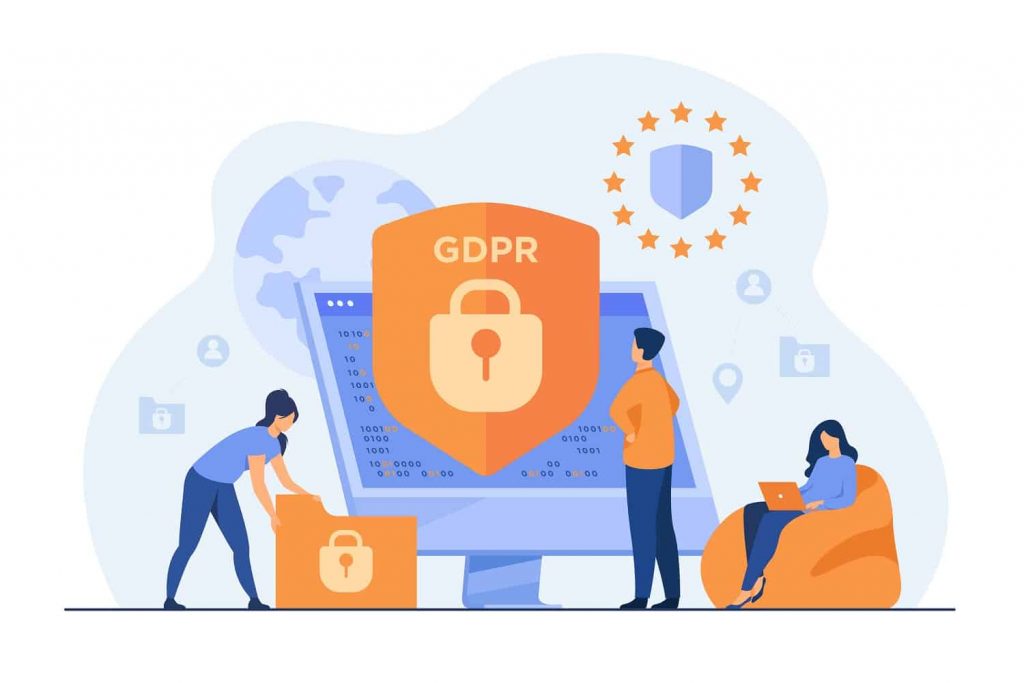
Google Analytics 4 Is NOT the GDPR-Compliant Alternative You Are Looking For!
Ideally, the perfect GDPR-compliant alternative to Google Analytics would be Google Analytics 4. Google is certainly going in that direction. However, things are not as simple as you would want them to be.
GA4 is a good product for statistical analytics and it certainly has privacy implementations that were lacking in the previous version. But, you will still be treading on muddy waters. Why? Because Google is an advertising company!
One of the main reasons for the birth of Google Analytics 4 is privacy and data regulation compliance. And, Google has taken several steps to tackle the problem:
- IP Anonymization, which is activated by default.
- Data storage duration: customers have complete control over data retention periods now.
- Choice of server locations
- PII: Google prohibits the collection of PIIs in GA4
- Consent mode transfer and data sharing options: (This is where things get interesting, let’s look deeper into it.)
But, even after all of this, Google is still bothered about PII. Why? Because, if you are using Google’s advertising services like Remarketing or Display Network, you might be sending them PII and this is where things get complex, again! Remember we mentioned that EU regulators are not trusting Google to safely process PII even if the data is anonymized? You get Google Analytics for free and this means you (and your valuable customer data) are the ‘product’!
If you collect PII on Google Analytics, even accidentally, you would not only be in regulatory trouble but will also be violating Google’s own policies. That basically means that all the liabilities shift to you and stop being Google’s problems.
This is what Google says about data collection:

Google leaves it to its customers to decide if they want to share the data with Google Ads, Google Signals, or any other products. If you mark the PII as ‘NPA’, the data will be used for analytical purposes only. But, you are not in control of how the networks you transfer the data to will process the data.
Read this from Google’s helpdesk:
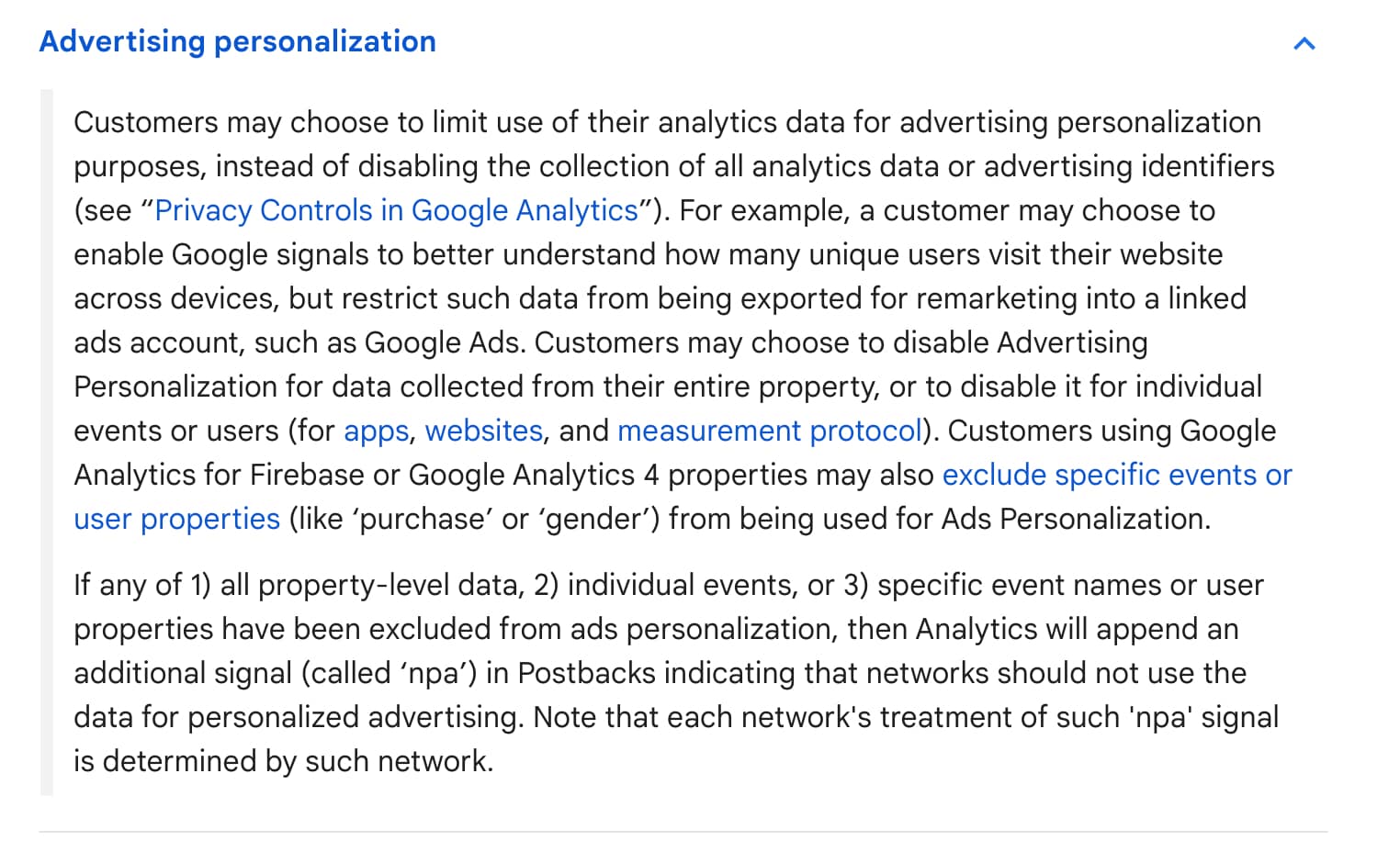
Google has created a way to activate ‘consent mode’ on the website and a granular implementation of it can be done with gtag commands. (Yes, you will be needing both a data officer and an IT expert to understand it!)
Consent mode is basically a layer of permission that is taken from visitors if they are ok with marketing and/or advertising cookies. So, if the visitor doesn’t provide permissions to these cookies, Google Analytics will anonymize the data by default and aggregate the data using just server ‘pings’ which are not associated with a cookie or any other identifiers. The data, as we mentioned earlier, is going to be used for statistical or data modeling purposes.
If the visitor consents to the analytical purpose cookie then tracking behaviors can be associated with the cookies. You can read more about how data transfer affects the consent mode here.
Again, to re-emphasize, all of this is really convoluted. If you want to comply with GDPR, you have to make sure that you are not passing any PII to Google’s advertising products. And, it would be very easy for you to pass PII to them. Google is not making money from you but from the advertising services and for that, it will need data to personalize ads. It’s all about understanding the incentive of your provider.
In our opinion, this is very much against Murphy’s law (“Anything that can go wrong will go wrong”).
GA4 is still a strong contender for visitor analytics but if you want to remain compliant with data regulation policies, you need to make sure you are:
- Not enabling data sharing with other Google products.
- Using Google Analytics 4 for only for statistical analysis
- Using Google Analytics 4 in an anonymized format.
All of this can leave you at a serious competitive disadvantage because GA4 doesn’t shape up to be an ideal tool for customer journey analytics and attribution modeling for B2B.
Sigh!
What To Look For in an Alternative?
It is clear that you need to start digging for alternatives and do not worry, we will provide solutions to all of the worries that we laid out in the previous sections. Let’s answer a few questions first!
Why do you want to track your visitors? Do you need the data for website analytics? Or, do you need the data for your sales and marketing purposes?
If your answer is the former and you need data for statistical analysis, Google Analytics 4 is a decent fit provided you are okay with the risks we mentioned in the previous section.
If you are a B2B business, it is highly likely that your answer is the latter or both. If you need tracking for sales and marketing purposes, you would utilize the data for things like customer journey tracking, attribution, funnel tracking, and sales conversion tracking. In many of these cases, your tracking system would also be working with other tools in your marketing tech stack and your CRM. Essentially, you will be using PIIs not only during your tracking but also when syncing the data to other platforms. In this case, Google Analytics 4 is not the solution for you.
So, what’s the solution?
A vendor that only focuses on first-party cookies without any ifs-and-buts and without the need for extra care. The only sole purpose of existence for this vendor is lawful data processing to provide analytics and tracking services to its customers and nothing else.
Here’s a TL;DR before we go into alternatives:
- A solution that doesn’t monetize your data or use it for other purposes.
- A solution that is not bound by complex US-EU relationships i.e a provider that does not answer to the US government.
- A solution that is ready for the cookie-less future.
Best Google Analytics Alternatives for 2022-2023
Now that we have addressed the why and how parts, it is finally time to get to what you originally came here for — Google Analytics alternatives. This list will include both alternatives to Universal Analytics and Google Analytics 4.
This is not a ranked list. We are not saying one tool is better than the other. You now know what to look for. Take trials, keep the long-term view of the future in mind and pick your tool accordingly.
Salespanel
Alternative to: Google Analytics 4
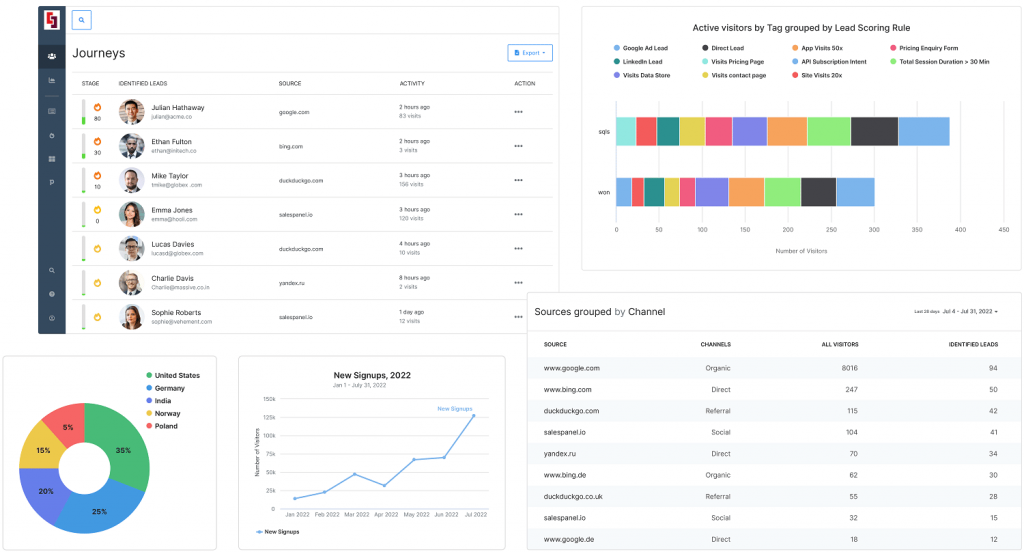
We are starting this list with our own product. Salespanel is a customer journey tracking and B2B analytics solution that helps you track first-party data from your website and connects it to your customers. So, while in traditional analytics, you get wholistic data for analytics, Salespanel provides you analytical data that actually connects with your customers. This is ideal for B2B businesses who want to use buyer intent data to score leads, automate workflows, or personalize their marketing and sell better. The analytical data along with their lead scores can be sent to sales reps who can use it to understand behavior and intent.
So, how does it stand as a Google Analytics alternative?
Salespanel is NOT an alternative to Universal Analytics but, it is an alternative to what Google is trying to do with Google Analytics 4. It not only connects your customer analytics to customer accounts but also solves the cookie and GDPR problem we mentioned earlier. Salespanel only collects first-party data and it doesn’t monetize or utilize the data at ‘rest’. Salespanel provides GDPR-compliant tracking. The tracking only kicks in when your cookie manager or consent mechanism gets the consent. Read more about it in our documentation.
Getting back to the EU ban, regulators in the EU are primarily worried because Google uses the data at rest to fuel its advertising platform. This gives power to marketers and advertisers to leverage PII of customers for focused targeting. The regulators are also worried that Google has sourced so much data that even if the PII is anonymized, they can put everything together using what they already know. These problems are avoided by Salespanel because:
- We don’t use the data at rest for other purposes.
- We don’t use third-party cookies.
- Tracking can be disabled before consent is obtained.
- Salespanel is not based in the USA and is not bound by the CLOUD act.
Learn more about Salespanel’s analytics solution here. Feel free to have a chat or schedule a call to discuss more!
Kissmetrics
Alternative to: Google Analytics 4
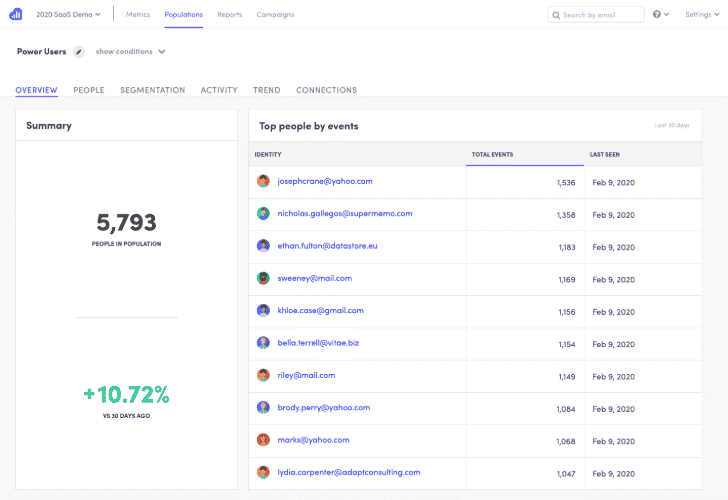
Kissmetrics is a product analytics tool that also connects your analytics data to the actual prospect. It focuses on helping you gather revenue data and use your analytical data to run optimizations. So, Kissmetrics, instead of providing you just analytical data like Google Analytics, provides you the data to optimize your funnel, run marketing actions, and connect your marketing efforts with revenue. For example, you can set up workflows to automatically send email campaigns to an audience or monitor your most important customers.
Kissmetrics, much like Salespanel, is also future-ready as it focuses on an event-based tracking model similar to what Google is trying to push with Google Analytics 4. However, coming to the data regulations front, Kissmetrics is based in California, USA. So, there might be a hiccup there when it comes to actual GDPR compliance.
Plausible Analytics
Alternative to: Universal Analytics
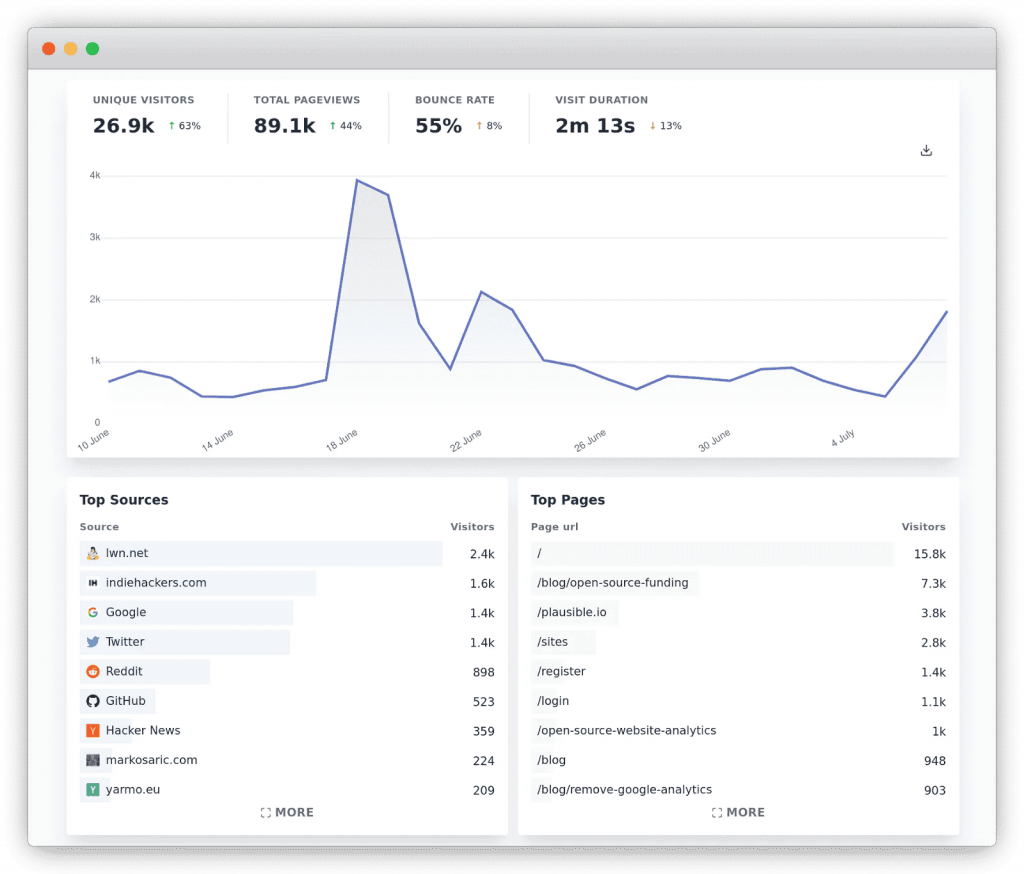
Plausible Analytics is the first product on this list which is a replacement for Universal Analytics instead of GA4. When we think about one company that benefitted the most from Google shutting down Univeral Analytics, we think it’s this one. 😀 Plausible is a simple active analytics product that provides you the analytical data you need with minimal effort. The product is extremely light and there’s no funny business going around behind the scenes.
It provides you the most important data you need in the simplest way possible. If Google Analytics is Paint 3D then Plausible is classic MS Paint. If you need a tool to quickly draw something, MS Paint is what you would open. The case is similar here. The best part about this product is that it has been built with privacy in focus and it is completely open-source. Plausible doesn’t use your data at rest and doesn’t use any cookies. Your data completely stays in your control and the company and its servers are located in Europe. There is one small problem, however. Plausible collects IP addresses anonymously through ‘IP hashes’. While this is much better than plainly storing IP, it can be combined with other data points to identify a user. And, things become complicated and debatable here when it comes to GDPR. There is one similar product that doesn’t do this and we will talk about it later in the article.
Regardless, if you are looking for a simple Universal Analytics alternative, Plausible is one of the best options. However, the data is not actionable for B2B marketing and is purely for analytical purposes. Since it does not store cookies, it can’t also tell when a visitor has returned to your website. This is one of the many limitations of simple analytics. But, it is ideal for businesses who are looking for an alternative to their current Universal Analytics setup.
Mixpanel
Alternative to: Google Analytics for Product Companies
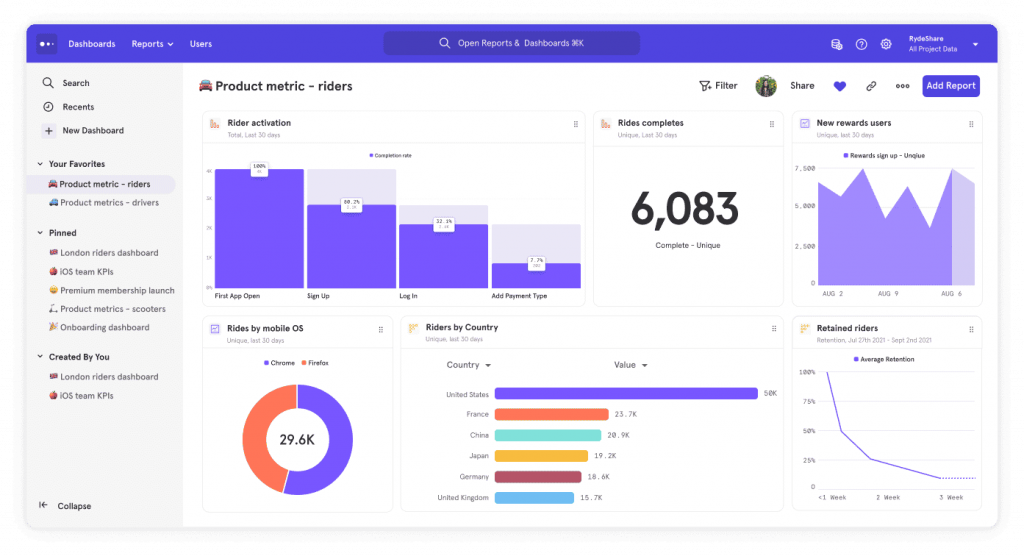
Mixpanel is a product analytics solution that combines your web, mobile, and application data and gives you unified user analytics. Essentially, while Google Analytics focuses on visitors, Mixpanel focuses on product users. And, Mixpanel’s tracking system is event-based which makes it an alternative to Google Analytics 4 instead of Universal Analytics.
This is clearly a product-focused analytics solution so if you are a SaaS or a similar company, Mixpanel is a good choice for you. It tracks a product user’s journey in your funnel and provides you key information on how each user engages through key stages of the funnel. Another important use case of Mixpanel is to enable product marketers to change and test their product marketing messages to improve user experience and retention.
Mixpanel passes the future test as it focuses on tracking and analyzing in product usage through event tracking across the web and mobile application environments without relying on third-party cookies (to our knowledge). The company, however, is located in the United States which could pause problems considering the tumultuous US-EU relations as we discussed earlier. Regardless, this is still a fantastic choice for companies who specifically need product marketing analytics.
Simple Analytics
Alternative to: Universal Analytics
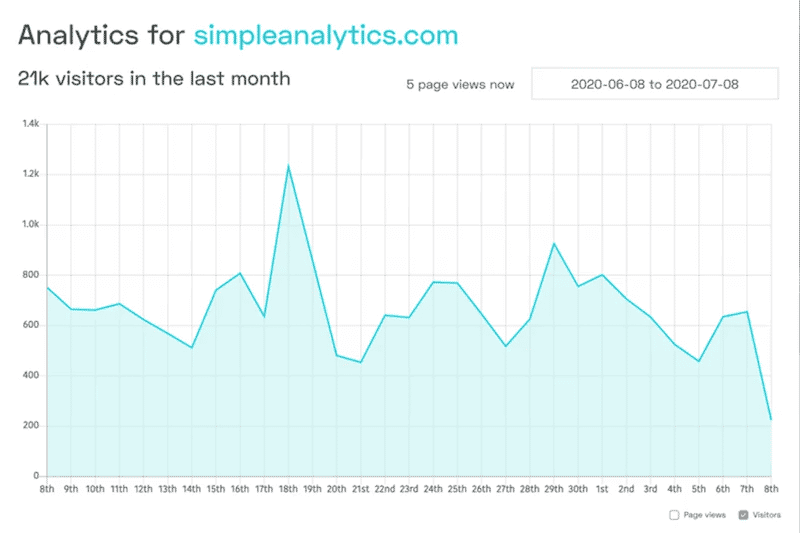
Simple Analytics, as the company name suggests, is a simple web analytics solution. This product has a positioning that is very similar to Plausible Analytics. In fact, both companies share a mutual respectful rivalry. Much like Plausible, Simple Analytics is also a lean analytics tool that focuses on giving you the data you need while focusing on user privacy.
Remember we talked about IP hashes when digging into Plausible? Simple Analytics does not collect IP data and stays in the clear when it comes to privacy. It also doesn’t collect cookies and is safe when you consider the cookieless future. Simple Analytics stores data in the Netherlands so that’s another plus point in its favor. Overall, when it comes to GDPR and privacy, Simple Analytics will be hard to beat. The downsides of this product are similar to other simple web analytics products like Plausible. No multi-session tracking, no customer journey analytics, and you only get surface-level analytical data.
Hotjar
Alternative to: Google Analytics
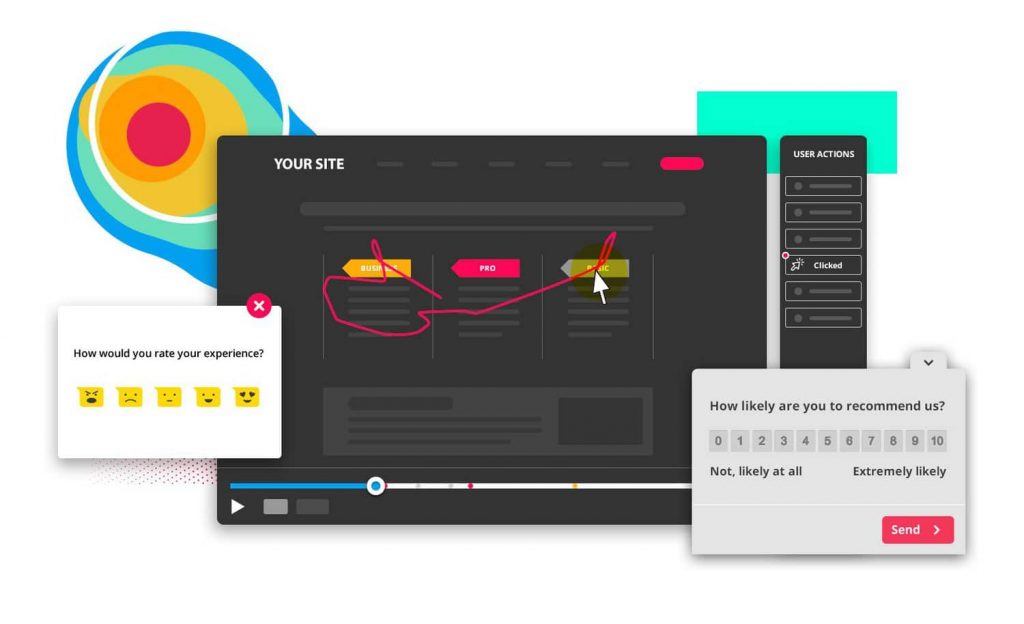
Hotjar is a website heatmaps and behavior analytics tool that helps you understand how users interact with your website. The key difference here is that while Google Analytics is an analytics and data generation tool, Hotjar provides you analytics to improve user experience and optimize your conversion. Hotjar focuses on the user instead of data and helps you understand why and how users perform certain actions. Whether it’s a subscription or a bounce-off from your website, Hotjar helps you visualize the journey of your visitors on your website. Hotjar also provides Net Promoter Score (NPS) tools that can be used to instantly collect feedback from your visitors.
Hotjar is not a direct Google Analytics alternative but it is worth a mention as heatmap analytics tools are frequently grouped and compared with web analytics tools. Coming to GDPR, Hotjar can record the entire session of your visitor and connect it to an email address if that is provided during their feedback process if the user has provided consent. Since consent is duly collected, it should theoretically be compliant. Hotjar is also located in Malta and its servers are located in Ireland. This is another positive when it comes to regulations. If you are looking for a behavior analytics tool that can help you improve user experience and conversion funnels, Hotjar is a good choice.
That’s the end of the list. There are several tools out there in the market and it is not possible to cover all the good ones. We will periodically update the article to include more entries.
Final Thoughts
The web analytics industry is changing rapidly. Businesses that are serious about user privacy need to step up and prepare for what’s to come. If you are a Google Analytics user who is panicking about the sunsetting of Universal Analytics and don’t know what to do with GA4, this is perhaps the time to rethink! Your data is not going to be migrated anyways. Why not try out your options? Always remember, if you get something for free, you are the product. We hope this article has been helpful for you. If you need any help, please feel free to contact us!
Sell more, understand your customers’ journey for free!
Sales and Marketing teams spend millions of dollars to bring visitors to your website. But do you track your customer’s journey? Do you know who buys and why?
Around 8% of your website traffic will sign up on your lead forms. What happens to the other 92% of your traffic? Can you identify your visiting accounts? Can you engage and retarget your qualified visitors even if they are not identified?


